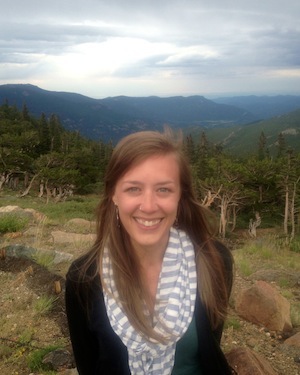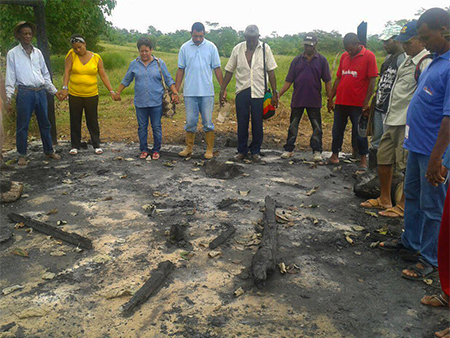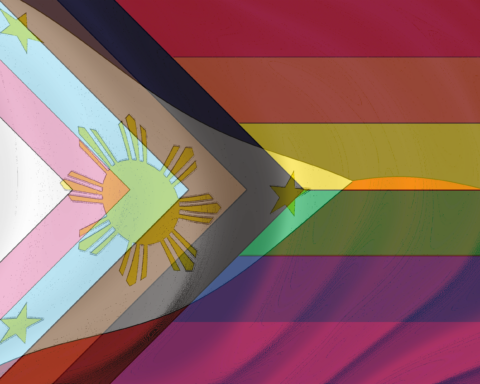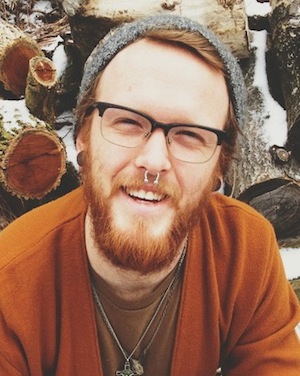
I sat on the front porch of an hermano – a “brother” – from the small, Pentecostal-feeling Presbyterian church in a small town in the region of Uraba, Colombia. My sweaty legs stuck to the plastic chair, and I briefly wondered if the water used to make the lemonade I was so gratefully sipping was purified. We sat for a few minutes in silence, watching motorcycles and a horse pass by on the dirt road that in another hour would turn into a small river as the May afternoon rains brought momentary relief from the heat. I shifted in my seat, trying to get some air to my legs and back while still sitting modestly in my knee-length skirt. The pastor began to read from his worn, leather King James Bible – James 2:14-17.
What good is it, my brothers and sisters, if you say you have faith but do not have works? Can faith save you? If a brother or sister is naked and lacks daily food, and one of you says to them, “Go in peace; keep warm and eat your fill,” and yet you do not supply their bodily needs, what is the good of that? So faith by itself, if it has no works, is dead.
After the pastor prayed, the hermano asked us to pull our chairs in closer so the neighbors wouldn’t hear as he told us his story about losing his land to armed groups. When he tried to organize and get back the land that he and many others in his community had lost, the armed groups began following and intimidating him. For about an hour, this hermano told us about his family, his loss, la lucha, and his faith. We prayed again to close our time together and called out “Dios le benidga” – “God bless you!” – as we walked back down the road toward the pastor’s house where my accompaniment partner and I were staying.

I heard many stories like this hermano’s throughout the month I spent in Colombia with the Colombia Accompaniment Program of the Presbyterian Peace Fellowship, but something about this man’s story stuck with me. It wasn’t the details of his story so much as the fact that he shared it with us right after we had heard the words from the Epistle of James. Our group of accompaniers had come to Colombia with a faith-based program to be with Presbyterians in Colombia who are committed to non-violence. We more or less had the faith part of James 2:14-27 covered, and we wanted to do something, to follow our faith with works – but what were we doing in Colombia? We were listening – listening to stories of people who have experienced and continue to experience pain and loss like I have never experienced and hope never to experience in my life. One woman with whom we spoke remembered hearing the familiar and terrifying sound of gunfire and gathering her children inside the house they had built in a new town – a town where they had moved to escape the violence that had forced them from the farm where her husband’s family had lived and worked for generations. When she and her children emerged from their home the next morning they found her sister’s son lying in a ditch with two other young men, bullets lodged in their young, now lifeless bodies.
What were we doing in Colombia? Listening to stories seemed so passive. At times, I thought what people really needed was a professional who could offer counseling, not a seminary-bound, upper-middle-class white US citizen to listen and nod as if I could possibly understand the loss being relayed to me in the equatorial heat. I felt guilty—for the role that my country plays in the violence in Colombia, for the fact that I had never experienced the kind of suffering present in their stories, for the feeling of relief that I had not suffered anything so horrible and heart-wrenching. I felt guilty that I had a college degree and healthcare and a US passport and a skin color that allowed me to move in and out of places as I pleased. The guilt that those of us with privilege feel when we begin to awaken to the reality of our privilege can be paralyzing. I felt guilty for my privilege and afraid that it would make any attempted expression of solidarity seem patronizing.
___________________________________________
The guilt that those of us with privilege feel when we begin to awaken to the reality of our privilege can be paralyzing.
___________________________________________
I believed that any act or expression of solidarity must be relational and based in mutuality, committed to de-colonization. Simply acknowledging our privilege – even sincerely wanting to rid ourselves of that privilege – is not solidarity. We cannot practice solidarity without acknowledging our privilege and the ways in hinders mutuality; however, we are called to move beyond the denial, anger, and even guilt to solidarity, which is the praxis of love.

In this sense, then, listening is an active expression of solidarity. Putting aside our own ideas and experiences to listen to the experiences of others is perhaps even the first act of solidarity. Listening can be subversive when those who typically have the privilege to speak and be heard stop talking and doling out advice in order to listen to the voices of those who are typically silenced. This involves gracious acts of mutuality: not simply our act of listening, but the Colombians’ gracious invitation to us to enter into the sacred space that is created when people share their stories and their very selves with one another.
James writes that faith without works is dead. The willingness to share a story that is painful without knowing how it will be received requires a great deal of active trust and willful vulnerability. Listening to those stories in a way that honors the spirit of the story and the person who tells it requires an active relinquishing of our own power and our tendency to interpret that story in a way that makes sense to us or assuages our own guilt. It is a work of mutuality, solidarity, and faith for everyone involved. It can be painful and dangerous work, but I am reminded that at the center of the Christian faith is an incarnate God who suffers. Our God does not necessarily take away the pain of the world but instead enters into the very depths of that pain. For those of us with privilege, the cross reminds us that being in solidarity with the oppressed can be painful and dangerous because the reality of oppression is often painful and is never safe. And lest I sound as if I am equating those with privilege with God, we must remember that Jesus was not a person of privilege in the Roman imperial context. Perhaps, then, acting in solidarity does not mean simply trying to give up our privilege to assuage our guilt, but instead using that privilege to enact change in the system from which we currently benefit.
___________________________________________
Listening in a way that honors the spirit of the story and the person who tells it requires an active relinquishing of our own power and our tendency to interpret that story in a way that makes sense to us or assuages our own guilt.
___________________________________________
In the context of my experience in Colombia, this means holding onto those stories our Colombian partners entrusted to us and sharing them with others in the US to inspire them to acts of solidarity – Stateside advocacy on behalf of Colombians or maybe even accompanying communities in Colombia themselves. Being in solidarity requires constantly evaluating how we are participating in the system which privileges the few and oppresses the majority – something that those who are oppressed by that system are much more aware of than we. It is a constant tension of listening and acting, of examining our privilege and using it in order to give some of it up, of recognizing the limitations our privilege presents in creating mutual relationships but being in relation with others anyway with the goal of mutuality. I am only beginning to learn how to do this, but it is work that I hope to continue for the rest of my life. It is work that is constant, often uncomfortable, and exhausting for everyone involved, but it is also work that is life-giving and faithful. “Faith without works is dead,” says James. Perhaps listening is the first step.
 AUTHOR BIO: Emily grew up in East Tennessee and is currently a Master of Divinity student at Union Theological Seminary in the City of New York. After graduating from Maryville College she served as a Young Adult Volunteer with the PC(USA) in Guatemala and in Nashville, Tennessee. Out of those experiences Emily began to more intentionally embrace the values of non-violence and community-building.
AUTHOR BIO: Emily grew up in East Tennessee and is currently a Master of Divinity student at Union Theological Seminary in the City of New York. After graduating from Maryville College she served as a Young Adult Volunteer with the PC(USA) in Guatemala and in Nashville, Tennessee. Out of those experiences Emily began to more intentionally embrace the values of non-violence and community-building.
Read more articles in this series.






Unbound Social